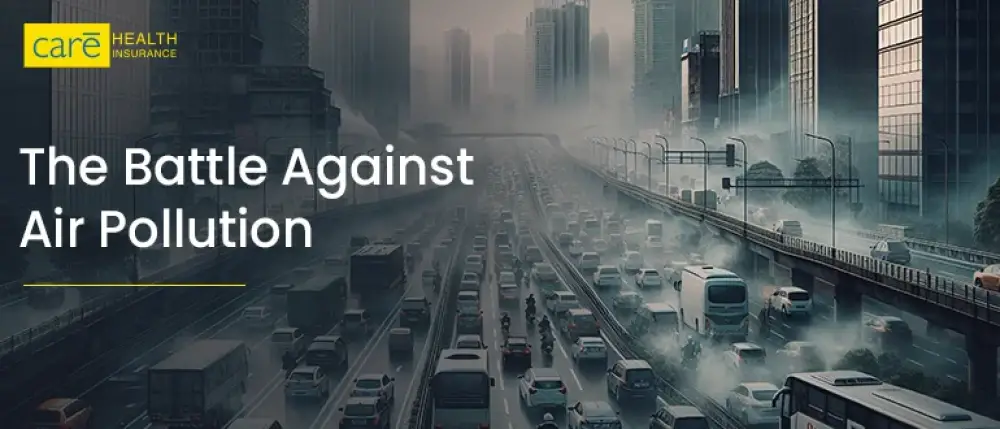Subscribe to get weekly insights
Always stay up to date with our newest articles sent direct to your inbox
Published on 26 Nov, 2024
Updated on 27 Mar, 2025
327 Views
4 min Read

Written by Anjali Sharma
0Like
Be the First to Like
Air pollution kills about seven million people worldwide every year. According to WHO data, nine in 10 people breathe air containing high levels of pollutants. Many government authorities are working to monitor air pollution and improve air quality. Daily exposure to high levels of air pollution causes various hazardous health outcomes. Air pollution and increasing AQI levels have adversely impacted the quality of life in many north Indian states, including Delhi NCR.
Air pollution is the contamination of the indoor and outdoor environment by any chemical, physical or biological agent. These pollutants modify the natural features of the atmosphere. Common sources of air pollution are household combustion devices, motor vehicles, industrial facilities and wildfires. Major hazardous pollutants, such as carbon monoxide, ozone, nitrogen dioxide and sulfur dioxide, cause respiratory disease. Air pollution and increasing AQI levels have adversely impacted the quality of life in many north Indian states, including Delhi NCR.
The Air Quality Index (AQI) is a measure of how clean or polluted the air around us is. It measures harmful particles like PM2.5, PM10, carbon monoxide, and sulfur dioxide.
In cities like Delhi, Kanpur, and Lucknow, the AQI often exceeds 400 during winter, making the air very unhealthy.
Air pollution is mainly caused by the release of harmful gases and particles into the atmosphere. These harmful substances come from natural and human activities. Let us discuss some of the common causes of air pollution:
There are multiple methods to control air pollution. Here are some common preventive measures to reduce and control air pollution.
There are many possible ways to reduce air pollution. By incorporating these actions into your daily life, you can contribute to cleaner air.
Air pollution poses a significant threat to environmental health and stability. It affects the ecosystem, wildlife, and overall balance of nature.
Some of the effects of air pollution on the environment are:
Read More: Air Pollution: A Leading Cause for Respiratory Diseases
Air pollution and worsening AQI are urgent challenges, especially in cities like Delhi, where the situation is alarming. With AQI levels often exceeding 400 during winter, the air becomes a hazardous mix of toxic pollutants. Breathing in such air is like smoking: Delhi's air now equals 50 cigarettes per day. That’s what you are inhaling in Delhi today. This miserable reality highlights the need for immediate action.
We must reduce emissions, adopt cleaner energy, and prioritise public awareness to combat this. Every small step, from using public transport to planting trees, can help. Let’s act today to secure cleaner, breathable air for a healthier tomorrow.
The impact of air pollution on public health cannot be overstated. Having the right health insurance is vital in such environmental conditions.
Disclaimer: The above information is for reference purposes only. Kindly consult your general physician for verified medical advice. The health insurance benefits are subject to policy terms and conditions. Refer to your policy documents for more information.
Be the First to Like
शुगर कंट्रोल कैसे करे? जानें, डायबिटीज में क्या खाना चाहिए Care Health Insurance in Health & Wellness
Thyroid : मामूली नहीं हैं महिलाओं में थायराइड होना, जानें इसके लक्षण और घरेलू उपचार Care Health Insurance in Diseases
हाई ब्लड प्रेशर को तुरंत कंट्रोल कैसे करें? देखें इसके उपाय Care Health Insurance in Diseases
प्लेटलेट्स की कमी के लक्षण, कारण और इलाज क्या है Care Health Insurance in Diseases
Seven Benefits of Good Posture You Must Know Care Health Insurance in Health & Wellness
Respiratory System: Anatomy of the Body’s Breathing Organ Care Health Insurance in Health & Wellness
Top Back Exercises to Strengthen Muscles and Prevent Injury Care Health Insurance in Fitness
Health Insurance Costs and Role of Fitness Programs Care Health Insurance in Fitness